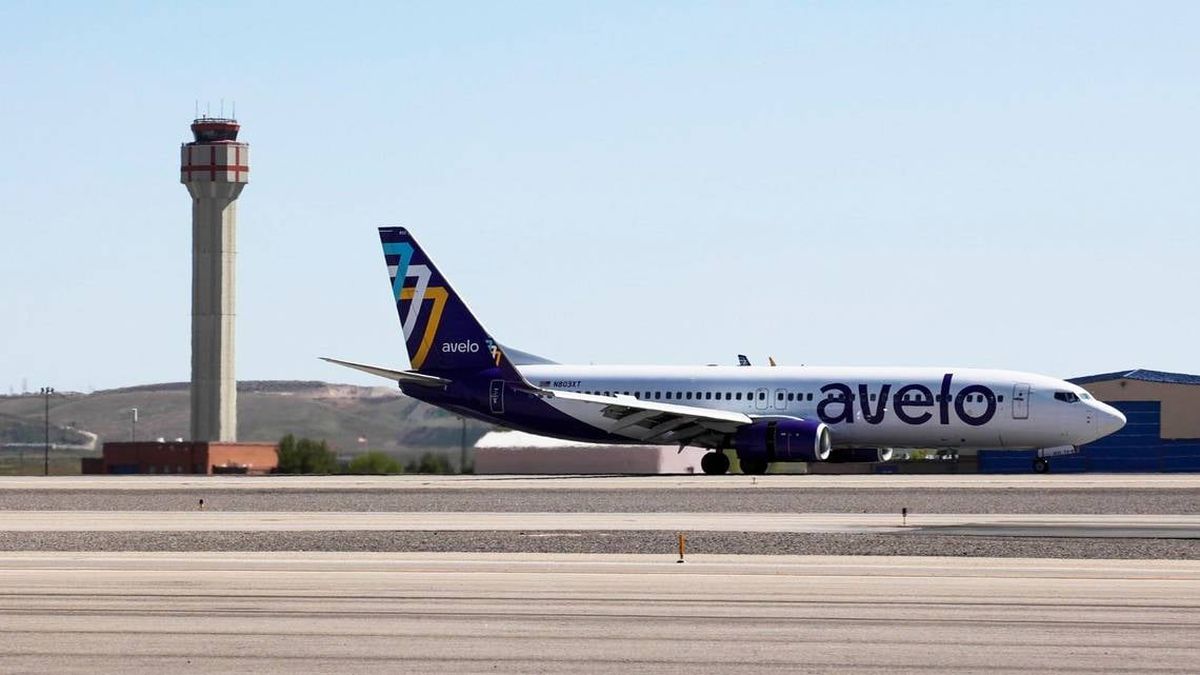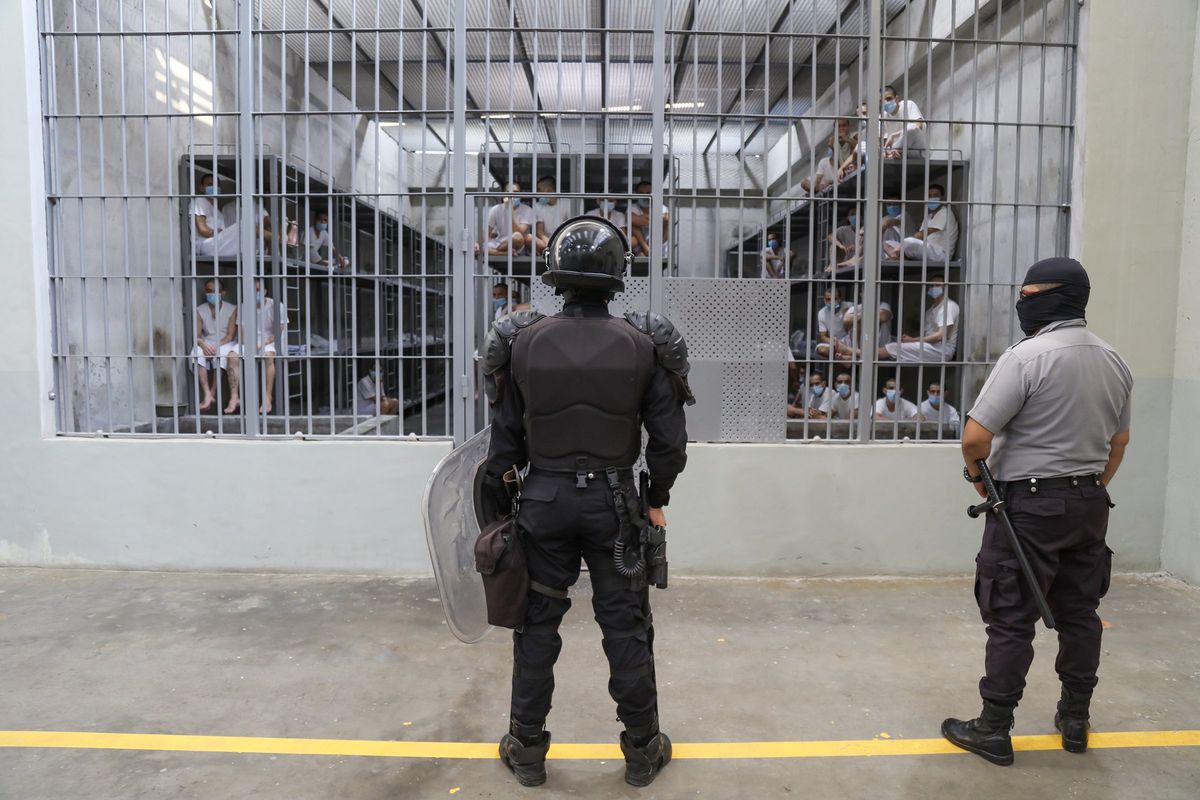A small airline’s side business: Deportation flights for ICE
Avelo Airlines, which launched service in Boise in May 2022, is ending operations at the airport later this month to accommodate a federal contract for deportation services with U.S. Immigration and Customs Enforcement. (Darin Oswald)
Avelo Airlines, an ultralow-cost carrier based in Houston, has agreed to operate deportation flights for the Department of Homeland Security out of Phoenix-Mesa Airport starting next month. The contract is unconventional for a commercial airline because the federal government relies mostly on private charter companies.
Andrew Levy, Avelo’s founder and chief executive, described the company’s decision to participate in the flights as financial. It has generated criticism from Democratic lawmakers, the largest flight attendants union and thousands of travelers who signed a Change.org petition to boycott the carrier.
“We realize this is a sensitive and complicated topic,” Levy said in a statement. “After significant deliberations, we determined this charter flying will provide us with the stability to continue expanding our core scheduled passenger service and keep our more than 1,100 Crewmembers employed for years to come.”
Avelo provided details of its “long-term charter program” in a statement to The Washington Post. The airline will use three Boeing 737-800s, which can seat up to 189 passengers, to transport people deported by Immigration and Customs Enforcement to facilities or staging grounds in the United States or to final destinations abroad.
A spokesperon for Homeland Security confirmed to The Post that Avelo will begin a subcontract through CSI Aviation on May 14. Public records show ICE awarded CSI Aviation a contract with a potential value of more than $151 million to be performed in Mesa, Arizona, the strategic center of ICE Air Operations. It is estimated to run from March through February. No subcontractors are named.
Avelo’s deal brings attention to what human rights advocates describe as an opaque network of government-funded charter flights to service the burgeoning industry of deportation, with a lack of oversight. ICE Air does not publicly disclose information about its flights. Researchers and media have used Freedom of Information Act requests to obtain flight tracking data sets.
The Trump administration has used social media to put deportation flights on display. On Jan. 24, White House press secretary Karoline Leavitt shared photos of shackled deportees in a post on X that warned “if you illegally enter the United States of America, you will face severe consequences.” On Feb. 18, the official X account for the White House shared a video captioned “ASMR: Illegal Alien Deportation Flight” with audio of jingling shackles. It has been viewed more than 104 million times.
Human rights and immigrant advocates have denounced conditions for deportees on flights, as have the governments of Brazil and Colombia. More recently, the administration flew more than 200 Venezuelans to El Salvador, where they are being held in a notorious prison.
President Donald Trump campaigned on removing immigrants illegally in the country. A news release ICE published in March touted 32,809 at-large arrests – made in the community, not already in custody – during Trump’s first 50 days in office, about 400 fewer than the total for fiscal year 2024. According to figures shared in the release, 73% of the people ICE arrested were convicted criminals or had pending criminal charges.
Avelo is casting its business deal in a patriotic light.
“Regardless of the administration or party affiliation, as a U.S. flag carrier when our country calls and requests assistance our practice is to say yes,” company spokeswoman Courtney Goff said by email.
At the airline’s new base in Arizona, crew members for these flights will wear a “generic uniform with no Avelo branding,” Goff said. The one nod to their employer will be a pair of Avelo wings. In addition, the aircraft will be all white, with no Avelo regalia.
Demand for deportations
The University of Washington’s Center for Human Rights has conducted research into the business of deportation flights since 2018. According to the center, the government began to shift its deportation efforts from military planes to the private sector during President Barack Obama’s first term.
According to ICE data, the agency has significantly increased the amount of people it has removed from the country in recent years, from just over 59,000 in fiscal year 2021 to more than 271,000 in fiscal year 2024.
Avelo said it operated some charters for deportation flights under President Joe Biden, but landing a long-term contract with DHS and dedicating crew and aircraft for the flights are new for the company.
The work can be lucrative.
In an earnings report last year, Miami-based private charter company Global Crossing Airlines projected that its subcontract to provide flights for ICE was worth $65 million over five years. According to the UW Center for Human Rights, ICE Air has relied primarily on one broker, Classic Air Charter, for contracting. Public records show Homeland Security awarded that company a contract worth more than $800 million during a period from 2017 to 2023.
Avelo launched in 2021 and operates in nearly two dozen states, Mexico and several Caribbean islands. It has not had an outpost in Mesa. The carrier said it will start staffing up with pilots, flight attendants and aircraft technicians. It will offer current employees the first opportunity to relocate to Mesa before filling openings with new hires.
A recent employment listing for an Avelo “flight attendant” described the job as “a charter program for the Department of Homeland Security … with domestic and international trips to support DHS’s deportation efforts.”
Responsibilities include ensuring “the safety, security, welfare and comfort of all Customers and other Crewmembers” and responding “safely and effectively to a broad range of in-flight emergencies.” Applicants must be willing to uphold such company standards as creating “a caring Customer experience on every flight,” from boarding to deplaning. The pay is $28 per hour for the first year, with 75 hours of work per month, guaranteed.
Avelo will provide the pilots and flight attendants for the deportation flights. Goff said flight attendants will not require additional training but “will follow any DHS protocols.”
Flight attendants raise safety concerns
The primary responsibility of flight attendants is to ensure the safety of passengers. According to the Association of Flight Attendants-CWA, which represents workers at 20 airlines, including Avelo, the restrictive nature of deportation flights prohibits them from doing so.
“Having an entire flight of people handcuffed and shackled would hinder any evacuation and risk injury or death,” the union said in a statement to the Post. “It also impedes our ability to respond to a medical emergency, fire on board, decompression, etc. We cannot do our jobs in these conditions.”
According to the ICE Air Operations handbook, adult detainees will be restrained by handcuffs, waist chains and leg irons. Only the flight officer in charge or their assistant can remove the restraints.
The members urged Avelo to reconsider its deal with ICE.
On April 5, AFA-CWA issued a broad resolution supporting immigrant rights. In the document, the union noted some of its members are undocumented immigrants and labeled recent ICE measures as “extreme and unlawful.” AFA-CWA also said it will press airlines not to work with immigration enforcement.
“Flight Attendants working charter flights carrying individuals for deportation have reported serious safety and health concerns due to extreme, unnecessary and inhumane measures enforced by ICE agents aboard these flights,” the resolution said, linking to a ProPublica report.
The article relied on accounts of unidentified flight attendants who worked deportation flights for Global Crossing Airlines.
“If you and I are on a plane, we’re not even allowed to have our purses out when the plane is taking off because you have to be able to get off the flight so quickly if there’s an emergency,” said Angelina Snodgrass Godoy, the director of the UW Center for Human Rights.
“Yet these folks are chained.”
Because of the steps involved in transporting deportees, Godoy said, the passengers may be constricted for hours or even an entire day.
The shackles stymie mobility and can cause physical pain. She said she has observed flights where people struggle to walk up the stairs and complain of losing feeling in their hands. Using the lavatory is imaginably difficult.
“They’re not allowed to remove those shackles,” she said, “an impediment if you have to go to the bathroom.”
Charters carry deportees, athletes or rock stars
According to immigration policy experts, the government may place one or two deportees on a commercial flight, but it typically relies on large charter companies to facilitate flights for the sole purpose of deportation.
One of the biggest is Global Crossing Airlines, or GlobalX. In between deportation runs, it flies touring musicians or elite athletes headed to high-profile games.
Tom Cartwright, an immigrant advocate and volunteer with Witness at the Border, said the use of a commercial airline is unusual.
Avelo “would be the only carrier that flies what I would consider to be retail clients that purchase tickets directly on their airline,” Cartwright said. “All the other carriers now and in the past have been charter aircraft where someone chooses the locations they want to go to.
“They might choose an NCAA game. They might choose the Masters Tournament.”
A report by the U.S. Office of Inspector General showed that in fiscal year 2017, ICE Air used about 20 times more private charters than commercial flights.
Cartwright tracks flights by tail numbers and counted 800 ICE Air flights last month, nearly 500 of which “were just moving people around in the country,” he said.
Newsweek reported in 2020 that United, Delta and American, three of the four biggest U.S. airlines, were operating deportation flights to Central America.
A new revenue stream
Since arriving on the scene four years ago this month, Avelo has flown more than 6.7 million passengers. It has hit some bumps on its journey. After less than a year of operations in Sonoma County, California, it recently closed its base there. Goff, the spokeswoman, said the airline left the area because of low demand and lackluster financial prospects.
“This has nothing to do with ICE charters,” she said.
After three years of serving Boise, the airline will pull out of Idaho later this month.
At the same time, Avelo is also expanding in some markets. In December, it announced five new nonstop routes from two Connecticut airports, including Tweed New Haven, the carrier’s largest hub, with 28 routes and nearly 300 employees. Of the company’s fleet of 20 aircraft, eight are based in the New England state.
“We love Connecticut and are excited to continue expanding our presence here,” Levy said in a statement at the time of the announcement.
The feeling is no longer mutual.
On Tuesday, Connecticut Attorney General William Tong, a Democrat, sent a vehement letter to Levy, denouncing the carrier’s decision to fly ICE detainees. He also raised concerns about the state’s continued support and investment in Avelo, which received a two-year exemption on state fuel taxes.
“Avelo has freely chosen to profit from and facilitate these atrocities,” Tong wrote. “The State of Connecticut has an obligation now to review this business decision and to consider the viability of our choice to support Avelo.”
In a Judiciary Committee meeting Tuesday, Connecticut legislators voted to advance a proposal that would stop companies that receive state funds from aiding immigration enforcement. The 29 Democrats on the committee voted in favor of revisons to the state’s Trust Act, which limits police from cooperating with immigration officials.
The 12 Republicans opposed it.
In his letter, the attorney general warned that Connecticut could reconsider the tax exemption for aviation fuel if Avelo didn’t agree to several stipulations. For instance, he asked that the airline would not operate flights with nonviolent shackled passengers who could not safely evacuate in an emergency. Nor would it transport bounded children. Or schedule deportation flights from any Connecticut airport.
Tong gave Levy until Tuesday to respond.

